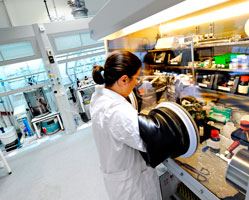Problems with overheating mobile phones could be reduced significantly thanks to a plastic being developed by Loughborough University scientists.
The new plastic, unlike the ones currently used in mobile phone covers, dissipates heat created by the lithium batteries and reduces the likelihood of injury to the owners.
Dr Sara Ronca, the principal investigator for the research into the plastic, said: “The current plastic cases do not dissipate heat and have been known to get too hot, with phones doing strange things.
 Dr. Sarah Ronca working in her laboratory.
Dr. Sarah Ronca working in her laboratory.
“For example, when you heat up plastic too much it will deform. If the plastic dissipates heat this will happen less.”
Dr Ronca said the new plastic is vital because the drive in electronics towards miniaturisation has increased the need for smart materials than can cope with things like heat dissipation.
It could be a major boost for manufacturers of all kinds of electronic devices like computers, as well as electric motors and generators, solar panels, batteries and heat exchangers in power generation.
It can be used as a heat sink in computers as a replacement for metals, which are expensive, heavy and also conduct electricity, and composite materials which are not only dearer but also harder to recycle because of the fillers they contain.
The plastic is called ultra-high molecular-weight polyethylene (UHMWPE) which is used to make a variety of products, from prostheses to body armour.
It is not normally good at conducting heat, but Dr Ronca has developed a method of synthesising and processing it so that it does.
She said: “We know that it works, we know it is thermally conductive, because we already have the data. What we have to do now is find out how we can tailor the material for any industrial application.”
Dr Ronca, from the Department of Materials, is building on work started by Professor Sanjay Rastogi.
She has received a £98,000 grant from the Engineering and Physical Sciences Research Council (EPSRC) for the two year project whose aim is to get the plastic ready for industry, with the participation in kind of Teijin Aramid, a company from the Netherlands.
Plastics do not conduct heat well because of the random paths and entanglement of their polymer chains.
UHMWPE is no different. While it has chains that are aligned in the same direction, which are vital for heat transfer, they are tangled like spaghetti. Therefore, it has low thermal conductivity and is also difficult to process.
But Professor Rastogi and Dr Ronca have developed a synthetic/processing strategy that allows achieving less entangled and highly aligned chains able to promote the heat transfer by something called lattice vibration.
She said: “We have devised a synthetic strategy that enables us to directly obtain UHMWPE with a reduced number of entanglements.
“It is easier to process this material in a way that chains are extended and nicely aligned.
“When you get this type of structure the polymer is not conductive electrically but it can conduct thermal energy by lattice movement.
“We have demonstrated that this material can be easily processed, without the need for any solvent, to give tapes and filaments with high chain alignment.
“The question is, can we get a material that has different thermal conductivities according to the polymer’s molecular characteristics?
“And can we tailor thermal conductivity by tailoring the material properties?
“The results from the project will enable us to realise a lightweight, cheap, easy to process and to recycle material where the thermal conductivity can be tuned in a range of useful values by suitable modifications of the synthetic processing steps.